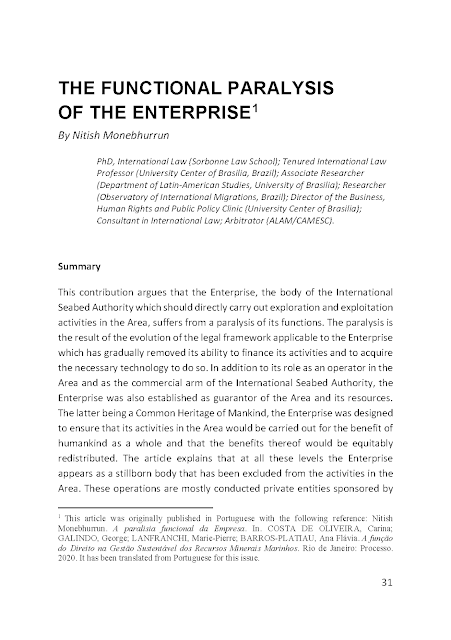 |
|
Ottawa Journal of International and Public Affairs,
Vol. 1, No. 1, July 2023, Ghazipur, London (United Kingdom). |
THE FUNCTIONAL PARALYSIS OF THE ENTERPRISE is an analysis by Professor Dr. Nitish Monebhurrun of the functional paralysis of the Enterprise in relation to the seabed. Nitish Monebhurrun is a PhD scholar of International Law (Sorbonne Law School), a Tenured International Law Professor (University Center of Brasilia, Brazil), an Associate Researcher (Department of Latin-American Studies, University of Brasilia), a Researcher (Observatory of International Migrations, Brazil), a Director of the Business, Human Rights and Public Policy Clinic (University Center of Brasilia), a Consultant in International Law, and an Arbitrator (ALAM/CAMESC). He has recently been appointed as Expert on Ocean Matters by the United Nations.
This contribution argues that the Enterprise, the body of the International Seabed Authority which should directly carry out exploration and exploitation activities in the Area, suffers from a paralysis of its functions. The paralysis is the result of the evolution of the legal framework applicable to the Enterprise which has gradually removed its ability to finance its activities and to acquire the necessary technology to do so. In addition to its role as an operator in the Area and as the commercial arm of the International Seabed Authority, the Enterprise was also established as guarantor of the Area and its resources. The latter being a Common Heritage of Mankind, the Enterprise was designed to ensure that its activities in the Area would be carried out for the benefit of humankind as a whole and that the benefits thereof would be equitably redistributed. The article explains that at all these levels the Enterprise appears as a stillborn body that has been excluded from the activities in the Area. These operations are mostly conducted private entities sponsored by States or by State-owned companies resulting in a privatisation of the Common Heritage of Humankind.
The article has been published in Vol. 1, No.1 of the Ottawa Journal of International and Public Affairs (OJIPA) in July 2023.It may be purchased here.
